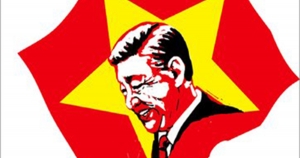Kevin Rudd
Neil Thomas reviews ‘On Xi Jinping: How Xi’s Marxist Nationalism is shaping China and the world’ by Kevin Rudd
How does Xi Jinping think? China’s leader since late 2012 is one of the most important but least accessible people in the world. He does not give interviews. His lieutenants do not leak to reporters. His associates do not write tell-all memoirs. The Chinese Communist Party is a secretive organisation that dominates the country’s information ecosystem by censoring speech and crushing dissent. We therefore know precious little about how decisions get made in Beijing.
... (read more)On 23 October 2018, at Parliament House Canberra, Professor Glyn Davis launched the second volume of former Prime Minister Kevin Rudd’s memoirs, The PM Years. Here is a transcript. ABR is grateful to Professor Davis for allowing us to reproduce his speech. Our review of The PM Years will follow. Neal Blewett reviewed the first volume for ABR.
... (read more)It has already become a cliché: Kevin Rudd’s memoir, 'Not for the Faint-Hearted', is not for the faint-hearted. More than 600 densely packed pages long, it contains some 230,000 words and over 1,000 footnotes, but by the end of the volume Rudd is yet to be sworn in as the twenty-sixth prime minister of Australia ...
... (read more)Much like her government, Julia Gillard’s memoir resembles the proverbial curate’s egg. Where her passions are involved, as with education (‘Our Children’) or the fair work laws, we are provided with a compelling policy read. Where they are not, as in large slabs of foreign policy, the insightful competes with the pedestrian, enlivened admittedly with her personal talents in handling the great and the good – handballing a football with Barack Obama in the Oval Office, for instance. A chapter on ‘Our Queen’ and the republic is rather jejune, though Gillard has a nice line on changes in the royal succession as providing ‘equal rights for sheilas’. The fact that ‘every prediction the departments of Treasury and Finance ever made about government revenue turned out to be wrong’ makes for dispiriting reading on fiscal matters.
... (read more)Paul Kelly’s considerable research ability, enviable political knowledge, narrative skill, and indulgence in polemics all figure in his new book. The former qualities make it a must-read for the politically engaged; the latter is so pronounced that such readers may succumb to frustration and throw the book at the wall before reaching the valuable final chapter where at last we arrive at a coherent account of the systemic roots of ‘the Australian crisis’.
... (read more)David Donaldson reviews 'Power Failure: The inside story of climate politics under Rudd and Gillard' by Philip Chubb
Speaking about the process of painstakingly researching the ‘terrible mistakes’ made on climate policy by the Rudd and Gillard governments over the six years of their existence, Philip Chubb told an audience at the Wheeler Centre that he ‘almost exhausted [himself] with gloom’. Indeed, this important book, which covers the Icarian trajectory of climate policy through Labor’s years in power, is hardly cheerful. Rather, Chubb hopes that the documentation and analysis of the many poor decisions will help legislators to overcome the challenges of implementing significant but controversial reforms in the future.
... (read more)The political assassination of Kevin Rudd will fascinate for a long time to come. As with Duncan’s murder in Shakespeare’s play it was done, as Lady Macbeth cautioned, under ‘the blanket of the dark’, literally the night of 23–24 June 2010. The assassins heeded Macbeth’s advice: ‘if it were done when ’tis done, then ’twere well it were done quickly.’ And as in Macbeth, the assassins were in the shadow of the throne. Even the old king approved: Bob Hawke, himself deposed in 1991, recognised at last that the removal of a Labor prime minister is sometimes necessary.
... (read more)The Australian ritual of a federal election campaign every two or three years is one in which voters are invited to participate in hyperbole. Reality is magnified a thousand times as the actors perform a finely choreographed political quadrille while their every word and gesture are scrutinised for meaning and analysed for nuance. Yet for all the expensive and lavish hoopla that now constitutes an election campaign, Australians are a reluctant people when it comes to getting rid of governments, however short they fall in expectations. On only eleven occasions in the 107 years of federation have they opted for change.
... (read more)Neal Blewett reviews 'Kevin Rudd: The biography' by Robert Macklin and 'Kevin Rudd: An unauthorised political biography' by Nicholas Stuart
One of the hazards of election years these days is the quickie biography of the latest Opposition leader. As Simon Crean missed out on an election, so he missed out on a quickie. On the other hand, in 2004 his successor Mark Latham scored two – or three if we include Michael Duffy’s comparative study of the two political bruisers Latham and Abbott. Not that it did Latham, or probably the reputation of the authors, much good.
... (read more)Clement Macintyre reviews 'Mortgage Nation: The 2004 Australian Election' edited by Marian Simms and John Warhurst
Australian elections are not what they used to be. The policy debates have been reduced to ten-second audio grabs. The big public rallies have been replaced with pre-packaged and scripted set-piece television events. According to the majority of the contributors to this account of the 2004 election, the passions that Australian voters once carried to the polling booth have been swapped for something much more prosaic. At the last election, our vote was apparently determined largely by interest rates and by mortgage costs. It seems that voters are now less animated by ‘It’s Time’ and more by ‘It’s Mine’.
... (read more)







